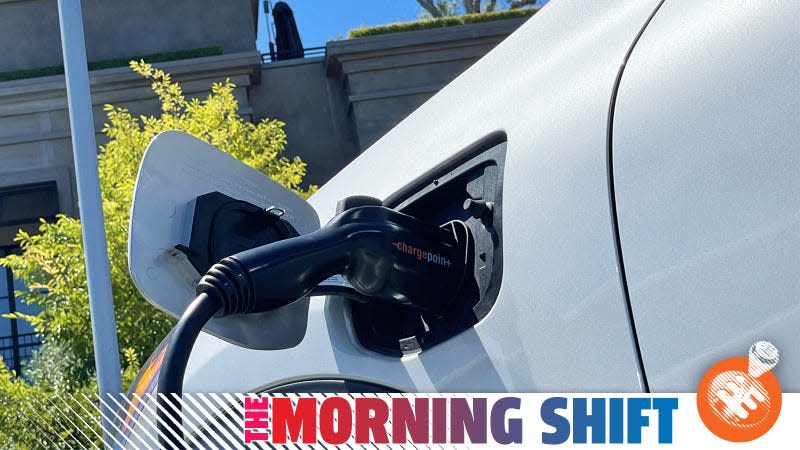Joe Manchin Pushes Bill to End Current EV Tax Credit Grace Period

The electric vehicle tax credit’s biggest enemy will stop at nothing, Tesla’s doubling down on Semi production in Nevada, and Volvo has a big recall on its hands. All that and more in The Morning Shift for Wednesday, January 25, 2023.
1st Gear: Manchin’s Not Happy
Since 2023 began, automakers have been able to skirt the rules about battery sourcing that break the federal EV tax credit into two halves. As a result, a number of vehicles that wouldn’t ordinarily qualify have temporarily benefitted from the full $7,500 rebate and may continue to until March, when the U.S. Treasury plans to relay guidance to manufacturers about battery manufacturing. Once the Treasury does that, the party’s over.
Read more
West Virginia Senator Joe Manchin, who fought to make the Inflation Reduction Act’s EV credit as exclusive as possible in the first place, seems to hate the fact that buyers will be able to catch a break for the next five or six weeks. He hates it so much that he’s proposed yet another bill, just to enforce the IRA’s full requirements immediately. Courtesy Automotive News:
The bill — titled the American Vehicle Security Act — would amend the Inflation Reduction Act so that the effective date of the required EV battery sourcing is no longer tied to Treasury’s release of proposed guidance on the restrictions.
If enacted, no credit would be available to any new EV that does not meet the critical mineral and battery sourcing requirements, effective retroactively as of Jan. 1.
A Democratic committee aide on Tuesday told Automotive News the bill did not yet have bipartisan support or co-sponsors because it had not been shared outside internal discussions. It also had not been shared with any auto industry representatives, the aide said.
Treasury is planning to issue proposed guidance on the consumer tax credit’s critical mineral and battery component requirements in March after missing its year-end deadline in 2022. It also will issue a proposed rule-making that further clarifies key provisions already in play, such as price caps and how vehicles are classified.
Considering how complex the bill is, you’d hope the government would take the time necessary to clarify its language for corporations and consumers. There’s a lot riding on this. But Manchin’s interest in the credit stops at “energy security” — whether anyone can actually claim it is secondary, which is why the IRA was written in such a way as to exclude possibly every current EV from the discount. Fitting, given where the senator’s allegiances lie. Here’s what he had to say in a statement issued Wednesday morning:
In a statement Wednesday, Manchin said it was “unacceptable” that Treasury has not yet issued the proposed guidance but continues to make the full $7,500 credit available.
The Inflation Reduction Act “is first-and-foremost an energy security bill, and the EV tax credits were designed to grow domestic manufacturing and reduce our reliance on foreign supply chains for the critical minerals needed to produce EV batteries,” he said.
There won’t be a need to grow domestic battery manufacturing if nobody can afford EVs for the next five years, which was probably the plan all along.
2nd Gear: Tesla’s Here to Stay (In Nevada)
Tesla has big plans for its Nevada plant, where it’s invested $6.2 billion since construction began on the site in 2014. In addition to expanding 4680 battery cell production for passenger cars, the hope is that factory in Nevada will become the hub for the automaker’s electric Semi manufacturing. From the Wall Street Journal:
Tesla Inc. said it would spend more than $3.6 billion to expand its plant near Reno, Nev., where the electric-vehicle maker assembles batteries and produces EV car components.
The Elon Musk-led auto maker said its investment plan would expand its lithium-ion battery and electric-vehicle-component facilities there and employ 3,000 additional workers.
One of the factories to be built would mass produce its semitrailer truck, while the other would make enough batteries for two million passenger vehicles every year, Tesla said in a blog post Tuesday.
The company since 2014 has invested $6.2 billion in Nevada and the 5.4 million square feet of facilities it has built there. It has also hired more than 11,000 employees to produce about 7.3 billion battery cells and 3.6 million drive units in the past nine years.
Nevada’s expansion plans come soon after the company filed paperwork for a potential $775 million expansion at its electric-vehicle plant near Austin, Texas, also set to focus on the production of batteries and car components.
Tesla’s Semis reportedly began production in October, and Pepsi — the EV maker’s first customer — expects to field 100 of them later this year.
3rd Gear: Them’s the Brakes for Volvo
Volvo announced a recall of almost 107,000 cars globally on Tuesday, covering 2023 versions of the C40, XC40, S60, V60, XC60, V90 and XC90. 27,500 of those are in the U.S., and the issue pertains to the brake control computer. Courtesy Kelley Blue Book:
The problem, Volvo tells federal safety regulators, starts when that computer runs a self-test to make sure it’s properly grounded. If the test returns an error, it can enter a fault state that shuts off multiple electronic safety systems.
Volvo says, “The driver display will always warn the customer with DIM messages and malfunction indication lamps if this issue occurs.”
Volvo is not aware of any accidents or injuries related to the problem.
The good news is that the remedy will be delivered over-the-air, as remedies to software problems always should. On one hand, that makes certain recalls much easier to deal with these days. On the other, it means carmakers feel encouraged to play fast and loose with this stuff, because it’s easy enough to patch later.

 Yahoo Autos
Yahoo Autos 